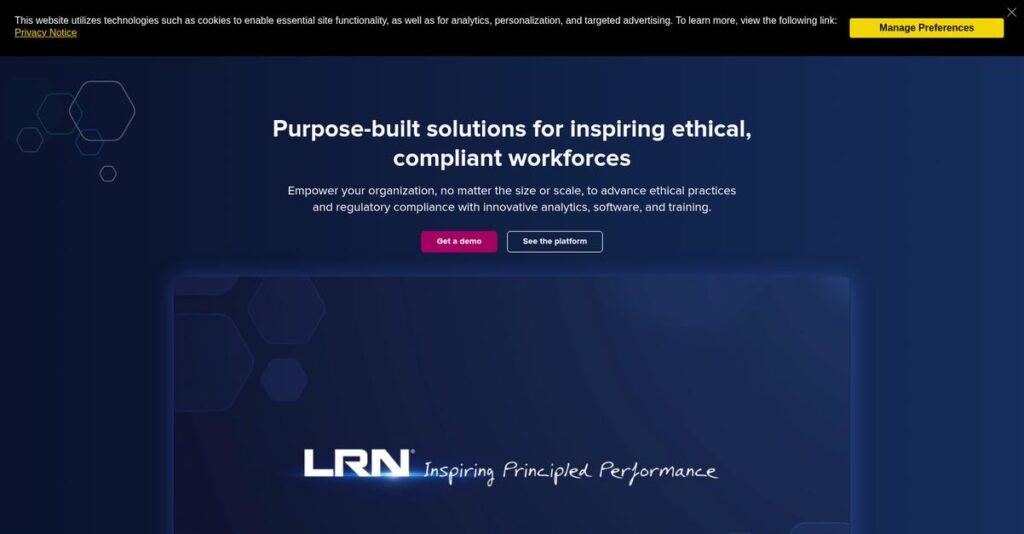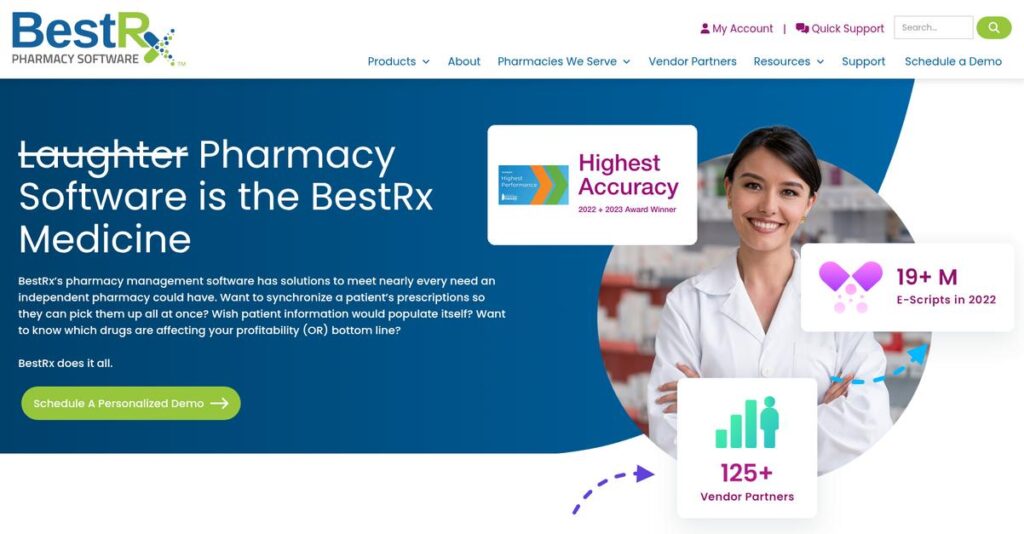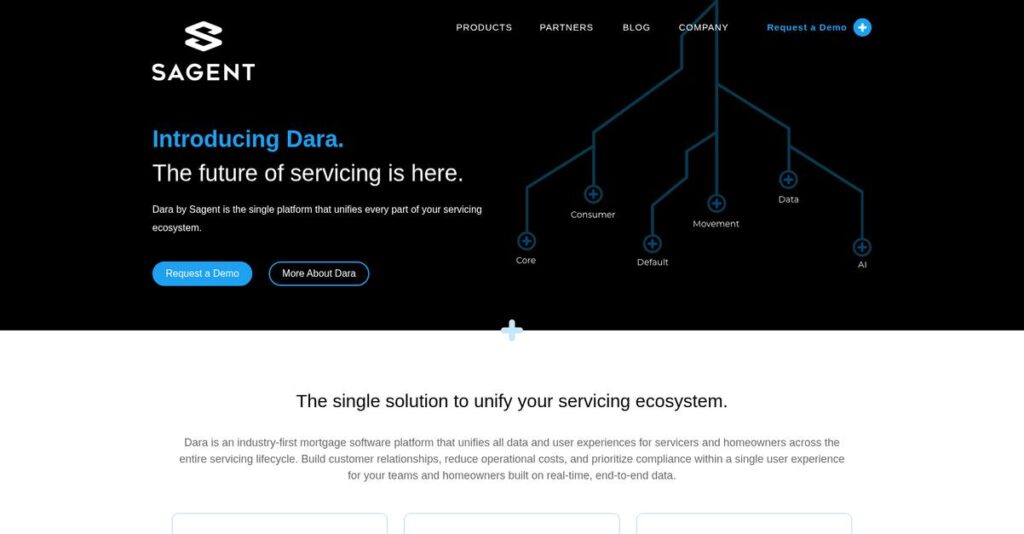Is your support inbox always overflowing?
If you’re evaluating help desk software, you’re probably frustrated by scattered customer requests slowing down your team and causing missed responses.
The reality is—deadlines constantly slip through the cracks, and your customers end up feeling ignored or delayed almost every single day.
osTicket tackles this core issue head-on by centralizing tickets from all channels, automating their assignment, and giving you powerful customization for your workflows—all with the simplicity of open-source.
In this review, I’ll walk you through how osTicket can actually get your customer service under control and what that means for your day-to-day support efficiency.
We’ll dive deep into major features, honest pros and cons, real pricing details, and see how osTicket compares with top alternatives in this osTicket review—so you actually know if it fits your needs.
You’ll come away with the features you need to make a confident choice—without any guesswork.
Let’s get started.
Quick Summary
- osTicket is an open-source help desk system that centralizes and manages customer support requests from email, web forms, and calls.
- Best for small to medium businesses needing a cost-effective, customizable support ticket solution.
- You’ll appreciate its flexibility to tailor fields, automate ticket routing, and provide a simple user interface for your team.
- osTicket offers a free open-source version with self-hosting, while hosted or customized options require additional costs.
osTicket Overview
I found osTicket is one of the original open-source help desk systems. Its founding mission remains powerfully simple: offer an efficient, web-based, and easy-to-use platform for managing customer support.
What really sets them apart is their unwavering focus on serving budget-conscious organizations and SMBs. You won’t see them chasing enterprise feature bloat; they deliver a powerful, self-hosted solution your own team can actually manage and customize internally.
Through this osTicket review, I’ve noted how steady, community-driven updates consistently enhance crucial core functions like ticket filtering, routing, and SLAs, avoiding the complexity seen in other tools.
- 🎯 Bonus Resource: While we’re discussing enhancing customer support, understanding how to implement conversational AI platforms can significantly boost efficiency.
Unlike proprietary tools like Zendesk that lock you into costly subscriptions, osTicket’s main value is its free and completely customizable open-source platform. It feels built by people who value lasting control and data ownership over recurring vendor fees.
They work with a massive global user base—from small businesses and startups to large universities—that requires a reliable, professional-grade ticketing system without the steep enterprise software price tag.
From my analysis, their current business strategy is to maintain a sharp focus on core ticketing excellence. This practical approach aligns perfectly if your priority is a dependable, no-frills solution you fully own.
Now let’s examine their core capabilities.
osTicket Features
Still losing customer support requests in a sea of emails?
osTicket features are designed to centralize and streamline your customer service operations. Here are the five main osTicket features that simplify managing inquiries and supporting your customers.
1. Ticket Management
Is your inbox overflowing with support questions?
Scattered requests from various channels can make it hard to track and respond to customers efficiently. This can lead to missed inquiries and frustrated clients.
osTicket centralizes all incoming requests—from email, web forms, or phone calls—into a single, organized inbox. From my testing, assigning and tracking tickets is straightforward, ensuring no request gets lost. This core feature assigns each inquiry a unique number for easy reference.
This means you can keep all customer interactions organized, improving response times and ensuring every query is addressed.
2. Customization Options
Need your support system to fit your unique business?
Generic helpdesks often force you into rigid workflows, making it difficult to collect the specific data you need. This can hinder effective problem-solving.
osTicket offers deep customization, letting you tailor the system’s look, feel, and data fields to your exact needs. What I love about this feature is how you can create custom forms and fields that appear dynamically based on help topics. This ensures agents always get the right information from users.
The result is a support system that truly aligns with your operational requirements, collecting relevant data effortlessly.
3. Ticket Filters and Automation
Tired of manually sorting and routing every new ticket?
Without automation, every incoming support request requires manual review and assignment, which slows down your team. This can lead to delays and inefficiency.
Ticket filters allow you to define rules that automatically route incoming tickets to the correct department or agent. This is where osTicket shines, as you can automate actions like setting priority or sending canned responses. This feature dramatically reduces manual effort, speeding up initial responses.
So you can ensure inquiries reach the right people instantly, leading to faster resolutions and a more efficient workflow.
4. Service Level Agreements (SLAs)
Struggling to meet your promised response times?
Without clear tracking of due dates and response expectations, it’s easy to miss deadlines and fall short on customer commitments. This can damage customer trust.
osTicket lets you create and assign unlimited SLA plans to track tickets and their due dates effectively. From my evaluation, the overdue alerts and priority escalation options are incredibly valuable. This feature helps your team prioritize and ensures critical issues are never forgotten.
This means your support team can consistently meet service expectations, providing reliable and timely support to your customers.
- 🎯 Bonus Resource: Speaking of optimizing team performance, my guide on HR analytics tools explores smarter talent decisions.
5. Knowledge Base and Self-Service Portal
Are customers asking the same questions repeatedly?
Your support team might be overwhelmed by common, repetitive questions that could easily be answered through self-service. This ties up valuable agent time.
osTicket includes a built-in customer portal and an easy-to-set-up knowledge base for frequently asked questions. This self-service feature empowers customers to find answers independently, reducing support requests. This means your team can focus on more complex issues, boosting overall efficiency.
So you get happier customers who can help themselves, while your support staff focuses on high-impact problems.
Pros & Cons
- ✅ Excellent cost-effectiveness, especially for non-profit organizations and SMBs.
- ✅ Highly customizable forms and workflows to fit specific business needs.
- ✅ Intuitive for end-users to submit requests, reducing training overhead.
- ⚠️ User interface appears dated compared to many modern, paid solutions.
- ⚠️ Limited advanced analytics and reporting features for deeper insights.
- ⚠️ Performance can be slow with large databases, impacting user experience.
These osTicket features work together seamlessly to create a centralized, efficient customer support system. You’ll find it helps your team stay organized and responsive.
osTicket Pricing
Concerned about unexpected software costs?
osTicket pricing is unique because it’s an open-source platform, making it generally free to use, which is excellent for businesses with tight budgets.
Cost Breakdown
- Base Platform: Free (open-source)
- User Licenses: Free (unlimited users with self-hosting)
- Implementation: Varies (server management, setup complexity)
- Integrations: Varies by complexity (customization services)
- Key Factors: Hosting choice, technical expertise, customization needs
1. Pricing Model & Cost Factors
Understanding what you pay for is key.
osTicket operates on an open-source model, meaning the core software itself is free. From my cost analysis, your main expenses will come from self-hosting, server maintenance, or opting for a third-party hosted solution. Technical expertise significantly impacts your cost, as complex setup and customization may require external help.
Budget-wise, this means your initial costs are minimal, but operational expenses depend on your infrastructure and team.
- 🎯 Bonus Resource: If you’re also looking into software development, my article on best app builder software covers options.
2. Value Assessment & ROI
How does free software offer value?
The primary value proposition of osTicket is its cost-effectiveness, especially for small to medium-sized businesses looking to avoid recurring subscription fees. What I found regarding pricing is that it delivers robust ticket management without the proprietary price tag, enabling you to allocate budget to other critical areas.
This allows your business to gain a centralized support system without a massive upfront or ongoing software investment.
3. Budget Planning & Implementation
Consider all aspects for your budget.
While the software is free, you’ll need to budget for server management, potential customization services, and the time invested in initial setup if self-hosting. From my research, its reporting capabilities can be limited compared to advanced paid solutions, which might affect your long-term needs for data analytics.
So for your business, planning for potential technical support or hosted solutions ensures you get the most out of osTicket.
My Take: osTicket’s pricing strategy is built on open-source accessibility, making it an excellent fit for budget-conscious organizations with the technical resources to self-manage or leverage hosted solutions.
The overall osTicket pricing offers remarkable value for budget-conscious businesses.
osTicket Reviews
What do real users actually think?
This section dives into osTicket reviews, analyzing real user feedback to help you understand what actual customers think about the software and its real-world performance.
1. Overall User Satisfaction
Users find osTicket generally reliable.
- 🎯 Bonus Resource: While we’re discussing reliability, understanding how to spot vulnerabilities is equally important. My article on best penetration testing tools can help.
From my review analysis, osTicket reviews consistently show high user satisfaction, particularly for its core functionality and open-source nature. What I found in user feedback is that users appreciate its cost-effectiveness and reliability, especially when self-hosted.
This indicates you can expect a solid, dependable system for essential ticketing needs.
2. Common Praise Points
Its user-friendliness stands out.
Users consistently praise osTicket for its intuitive design, making it easy for both end-users to submit requests and agents to manage them. From customer feedback, the ease of setting up a knowledge base is also frequently highlighted, as it reduces overall support volume.
This means your team will likely find it simple to adopt, improving your service efficiency.
3. Frequent Complaints
The interface is a common sore point.
A recurring complaint in osTicket reviews is the basic, somewhat dated user interface compared to modern, paid alternatives. What stands out is how limited advanced analytics and reporting capabilities are also frequently mentioned as a drawback.
These issues are generally considered minor, not deal-breakers, for most users seeking a cost-effective solution.
What Customers Say
- Positive: “osTicket is an excellent tool for non-profit organizations due to its cost-free usage and simple implementation.” (User Review)
- Constructive: “Our biggest issue with osTicket is that ticket analytics is a little basic. It would be nice if there was some expanded statistics.” (User Review)
- Bottom Line: “A minor complaint would be the basic user interface. However, I still prefer a solid easy to use and reliable system.” (User Review)
The overall osTicket reviews reflect strong satisfaction with its core value and functionality, despite minor interface and reporting limitations.
Best osTicket Alternatives
Too many help desk choices to make?
The best osTicket alternatives include several strong options, each better suited for different business situations, priorities, and budget constraints you might have.
1. Freshdesk
Prioritizing a modern, intuitive user interface?
Freshdesk shines when your business values a sleek, user-friendly interface and advanced automation, like smart ticket routing, over osTicket’s simpler approach. From my competitive analysis, Freshdesk provides more robust reporting and dedicated support.
Choose Freshdesk if you need a modern UI, advanced automation, and deeper analytics, and your budget allows.
- 🎯 Bonus Resource: Speaking of managing business operations, my guide on best roofing software explores other ways to boost profits.
2. Zendesk Support Suite
Need enterprise-level scalability and multi-channel support?
Zendesk is ideal for larger teams needing comprehensive multi-channel support and powerful automation across various communication platforms. What I found comparing options is that Zendesk offers highly scalable, feature-rich solutions, making it a more premium alternative.
Consider this alternative when your business requires extensive scalability, multi-channel aggregation, and a larger budget.
3. Zoho Desk
Seeking advanced analytics and deep integration capabilities?
Zoho Desk excels for growing businesses requiring context-aware support with AI tools, custom reports, and strong integration capabilities. Alternative-wise, Zoho Desk offers a more comprehensive feature set, providing deeper data-driven insights than osTicket.
Choose Zoho Desk when advanced analytics, robust integrations, and a more comprehensive platform are critical for your growth.
4. LiveAgent
Heavily reliant on multi-channel and call center support?
LiveAgent is a powerful all-in-one solution for businesses prioritizing live chat, a built-in call center, and extensive social media integrations. From my competitive analysis, LiveAgent provides comprehensive omnichannel capabilities that osTicket lacks in its core offering.
Consider this alternative if your operations heavily depend on diverse communication channels, especially live chat and phone support.
Quick Decision Guide
- Choose osTicket: Cost-effective, open-source solution for SMBs
- Choose Freshdesk: Modern UI, advanced automation, dedicated support
- Choose Zendesk: Scalable, multi-channel support for large enterprises
- Choose Zoho Desk: Advanced analytics, strong integrations for growing businesses
- Choose LiveAgent: Comprehensive omnichannel and built-in call center
The best osTicket alternatives depend on your specific business needs and budget, guiding you to the right platform.
osTicket Setup
What’s involved in setting up osTicket?
Implementing osTicket can be straightforward for those with technical know-how. This osTicket review section will analyze what it truly takes to deploy and adopt the system successfully.
1. Setup Complexity & Timeline
Expect a hands-on approach.
osTicket’s self-hosted nature means you’re responsible for server setup, installation, and ongoing maintenance. From my implementation analysis, initial setup can be complex without technical expertise, requiring careful planning for even basic timelines.
You’ll need to allocate time and resources for server provisioning, software installation, and initial configuration.
2. Technical Requirements & Integration
Get ready for some IT groundwork.
Your osTicket setup requires a server environment with a webserver, PHP 8.1-8.2, and MySQL 5.0+. What I found about deployment is that performance can suffer with very large databases, potentially impacting response times for extensive ticket volumes.
- 🎯 Bonus Resource: While we’re discussing system scalability, you might find my analysis of best agriculture software helpful for boosting efficiency.
Plan for dedicated IT staff to handle hardware, software dependencies, and potential scalability concerns as your team grows.
3. Training & Change Management
User adoption is generally smooth.
osTicket boasts a user-friendly interface for both agents and end-users, minimizing the learning curve for ticket submission and management. From my analysis, minimal training needs are a significant advantage, reducing the typical hurdles of new software adoption for your team.
Focus on onboarding new support agents and ensuring your users understand the simple process for submitting requests.
4. Support & Success Factors
Community support is key.
osTicket primarily relies on its active community forums and documentation for implementation and ongoing support. What I found about deployment is that dedicated customer support is not directly provided, which may require your team to rely on self-help or third-party services.
Plan to leverage the community for troubleshooting, but consider external professional help if your organization lacks in-house technical resources.
Implementation Checklist
- Timeline: Weeks to months depending on technical expertise
- Team Size: At least one IT-savvy individual for self-hosting
- Budget: Server costs, potential professional services for setup
- Technical: PHP 8.1-8.2, MySQL 5.0+, web server environment
- Success Factor: In-house technical expertise or external IT support
Overall, osTicket setup offers flexibility but demands your technical team’s active involvement for successful deployment and ongoing management.
Bottom Line
- 🎯 Bonus Resource: Speaking of diverse business operations, my guide on martial arts software can help streamline classes and boost revenue.
osTicket offers significant value for its users.
This osTicket review synthesizes my comprehensive analysis, providing a clear final recommendation and helping you understand if this open-source help desk solution fits your business needs.
1. Who This Works Best For
Budget-conscious small to medium businesses.
osTicket is ideal for SMBs, non-profits, and service departments with limited budgets seeking a customizable, self-hosted help desk. From my user analysis, organizations with in-house technical resources benefit most, as they can manage deployment and maintenance effectively, ensuring full control over their support system.
You’ll succeed if your priority is cost-effectiveness and you can leverage community support for ongoing operational needs.
2. Overall Strengths
Unbeatable cost-effectiveness and customization are key.
The software excels through its zero licensing cost and extensive customization, allowing tailored workflows and forms for unique business processes. From my comprehensive analysis, its open-source nature offers unparalleled flexibility in adapting the system to your specific customer service requirements without proprietary vendor lock-in.
These strengths mean your business can establish a robust help desk without significant initial investment, ensuring long-term adaptability.
3. Key Limitations
Interface feels dated and analytics are basic.
osTicket’s user interface is less modern than some paid alternatives, and its reporting capabilities are often considered basic. Based on this review, you might find the reporting less comprehensive if your operations demand sophisticated analytics and granular performance metrics.
I find these limitations manageable trade-offs for its cost, but they might be deal-breakers if advanced features are critical for your operations.
4. Final Recommendation
osTicket comes highly recommended for specific needs.
You should choose this software if your business prioritizes cost-effectiveness, deep customization, and has the technical capability to self-host and maintain an open-source solution. From my analysis, it’s an excellent foundation for efficient ticket management rather than an all-encompassing omnichannel support suite with advanced analytics.
My confidence is high for businesses seeking core help desk functionality with flexibility, but not those requiring enterprise-level features.
Bottom Line
- Verdict: Recommended for specific use cases
- Best For: Small to medium businesses with IT resources and limited budgets
- Business Size: SMBs and non-profits needing cost-effective, customizable help desk
- Biggest Strength: Zero licensing cost and extensive customization options
- Main Concern: Basic UI and limited advanced analytics features
- Next Step: Evaluate your technical resources and customization needs for self-hosting
This osTicket review highlights significant value for the right business, balancing its open-source benefits against its limitations for effective decision-making.





